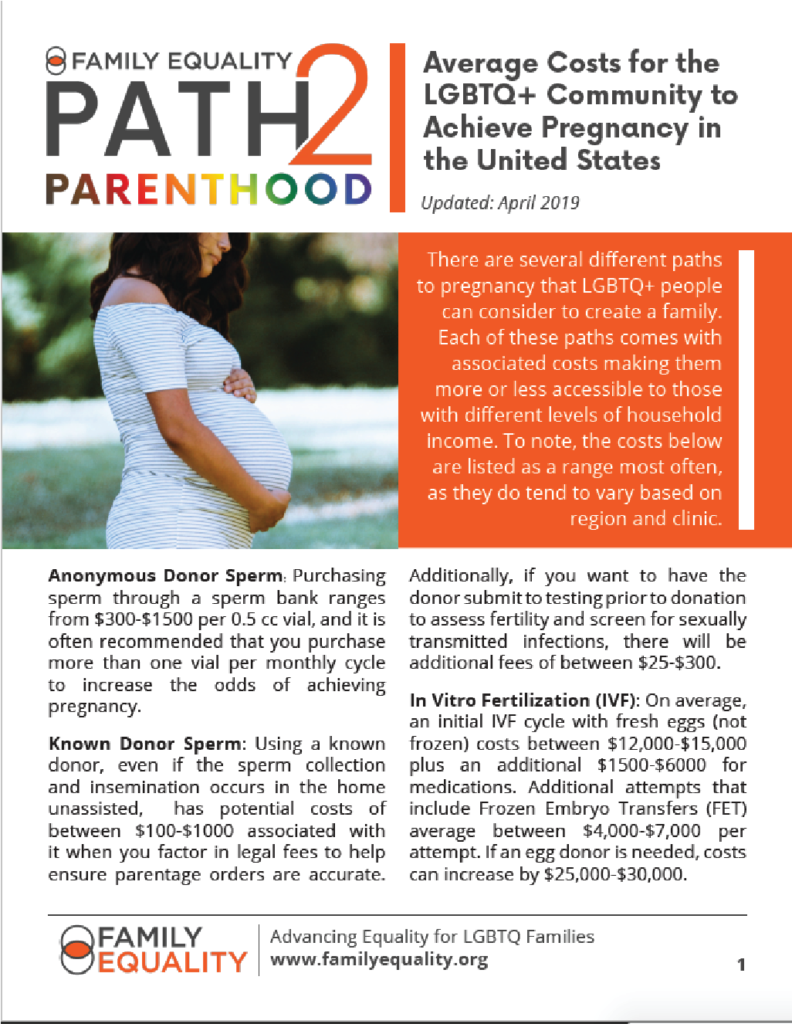There are several different paths to pregnancy that LGBTQ+ people can consider to create a family. Each of these paths comes with associated costs making them more or less accessible to those with different levels of household income. To note, the costs below are listed as a range most often, as they do tend to vary based on region and clinic.
Anonymous Donor Sperm: Purchasing sperm through a sperm bank ranges from $300-$1500 per 0.5 cc vial, and it is often recommended that you purchase more than one vial per monthly cycle to increase the odds of achieving pregnancy.
Known Donor Sperm: Using a known donor, even if the sperm collection and insemination occurs in the home unassisted, has potential costs of between $100-$1000 associated with it when you factor in legal fees to help ensure parentage orders are accurate. Additionally, if you want to have the donor submit to testing prior to donation to assess fertility and screen for sexually transmitted infections, there will be additional fees of between $25-$300.
In Vitro Fertilization (IVF): On average, an initial IVF cycle with fresh eggs (not frozen) costs between $12,000-$15,000 plus an additional $1500-$6000 for medications. Additional attempts that include Frozen Embryo Transfers (FET) average between $4,000-$7,000 per attempt. If an egg donor is needed, costs can increase by $25,000-$30,000.
(R-IVF): This version of IVF, where the eggs from one partner are fertilizes and transferred to the uterus of the second partner, has the same baseline cost of $12,000-$15,000 for the procedure. Both partners need medication, though, to prepare their bodies, so those costs increase to $3,000-$8,000 per cycle.
Intrauterine Insemination (IUI): Also referred to as “artificial insemination”, this method of conception can be performed at home by a nurse/midwife or in a doctor’s office. It ranges from $250-$4000 per attempt.
Gestational Surrogacy: Gestational surrogacy, where the individual carrying the pregnancy is not also the egg donor, ranges from $60,000-$150,000+.
Traditional Surrogacy: The cost of traditional surrogacy, where the individual carrying the pregnancy is also the egg donor, varies dramatically based on method of conception used (home insemination versus office insemination), the medical costs of the surrogate, and the legal fees associated with establishing parentage. The fees for traditional surrogacy tend to be lower than for gestational surrogacy, as IVF is typically not required. In the case of compassionate traditional surrogacy, the surrogate is not compensated for the pregnancy resulting in even lower total costs but even greater need for legal assistance to ensure parental rights are assigned as intended. It is important to note that compensated traditional surrogacy, or the contracts involved, are often not legal or enforceable in some states.
Egg or Sperm Freezing: For transgender individuals who choose to preserve their fertility by freezing eggs or sperm prior to transitioning medically, the costs can be steep as insurance rarely covers this type of fertility preservation. The average costs for sperm freezing are $250-$1500 per specimen with annual storage fees of $175-$750 per year. Egg freezing is substantially more expensive, as the process is more medically invasive to obtain the eggs. A single cycle of egg retrieval and freezing will cost, on average, $7,000-$12,000 with annual storage fees of $350-$700.
“DIY” approaches: LGBTQ+ people often rely on methods outside of typical heteronormative ideas about how families are made. These may include platonic co-parenting, intercourse outside of a relationship with the intention of achieving pregnancy, and using known donors and at-home inseminations, among others. Many of these methods still do require legal fees of $100-$1000 to help establish parentage. It should be noted that many LGBTQ+ parents don’t, for various reasons, secure legal parentage through the courts. This is a personal decision, and while Family Equality recommends securing legal rights to protect your family against unforeseen circumstances, each family unit will make the choice that works for them financially, emotionally, and legally.
Second or Step Parent Adoptions: Many LGBTQ+ parents choose to complete a step or second parent adoption to secure legal parental rights of the non-biological parent of the child(ren). The costs for this type of adoption vary depending on the requirements of the state, but often range between $250 and $3,000. In some states, the home study can be waived (a saving of $1,000 to $2,000), and forms can be filed without the assistance of an attorney (an average saving of $1,000).
Affording Your Path to Pregnancy
Depending on the route you pursue, there are different options available to help offset the costs of your fertility journey.
Insurance: Insurance policies vary dramatically on which fertility procedures they will cover and how they define eligibility for those procedures. Before you begin, contact your Insurance provider to learn which procedures are covered for you.
Fertility Loans: Certain financial organizations specialize in fertility financing, offering loans and payment plans for prospective parents. Surrogacy agencies and fertility clinics also sometimes offer financing for procedures not covered by insurance. The following organizations offer fertility financing loans to prospective intended parents:
Grants: Grants do exist to help the LGBTQ+ community offset family building costs, though qualification for this type of assistance is often geographical and limited. Learn more here.
Employer-sponsored Family Building Programs: Check in with your employer to determine if they offer reimbursement for fertility costs such as IVF and surrogacy. More often, larger employers are providing support to employees when their insurance policy does not cover fertility treatments.
To learn more about paths to pregnancy for the LGBTQ+ community, please visit the following resources prepared by Family Equality. If you have any questions along your journey, please don’t hesitate to reach out!

